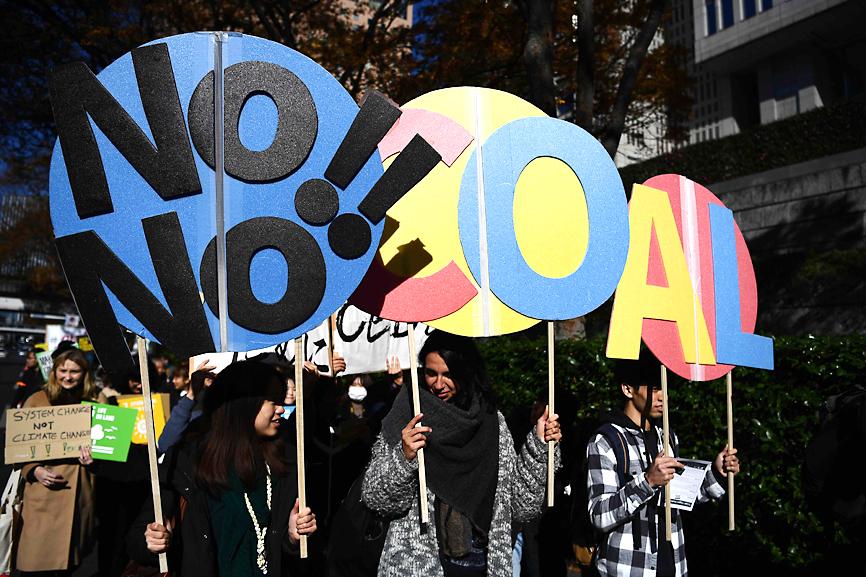Japanese engineering giant Toshiba Corp will not build any more coal-fired power plants and will shift to renewable energy in a bid to reduce greenhouse emissions, company president Nobuaki Kurumatani said yesterday.
However, none of its existing coal-power construction projects will be scrapped, said Toshiba, which has about 10 under way worldwide.
“We will stop accepting new orders to build coal-fired plants, and seek to cut greenhouse gas emissions by 50 percent by 2030,” Kurumatani told reporters.

Photo: AFP
He said that the company is to increase investment in renewable energy — including infrastructure for offshore wind-power and solar-power facilities, and research and development in related fields.
The announcement comes just weeks after Japanese Prime Minister Yoshihide Suga set a 2050 deadline for the world’s third-largest economy to become carbon-neutral.
Suga’s target date firmed up the nation’s previous climate-change commitments, as it plays catch-up with similar pledges made by other major economies.
Kurumatani said that business opportunities could arise from the Paris climate accord, which US president-elect Joe Biden has vowed to rejoin after US President Donald Trump’s withdrawal.
As well as selling mega solar and hydropower plants, “we plan to pour our resources into wind power and to produce cutting-edge windmills,” he said.
Germany’s Siemens Energy and General Electric Co of the US have made similar commitments to stop building new coal-fired power stations.
Greenpeace welcomed the move, with its climate and energy campaigner Daniel Read calling the news “heartening,” but emphasizing that “much work still remains.”
“A complete separation from coal, both new and existing projects, and moving wholly to renewables is the only option that makes long-term sense, both financially and environmentally,” he said in a statement.
Read warned against relying on nuclear power to reach net-zero emissions by 2050, saying it is not a “viable alternative.”
Japan, which is a signatory to the Paris agreement, has struggled to cut carbon emissions after shutting down reactors after the 2011 meltdown at the Fukushima Dai-ichi nuclear power plant.
Reliance on fossil fuels such as coal increased after that, as public anger over the accident pushed all of the nation’s reactors offline temporarily.
Japan’s 140 coal-fired power plants provide nearly a third of its total electricity generation.
Coal is the second-biggest power-generation method behind liquefied natural gas-fired plants.

Among the rows of vibrators, rubber torsos and leather harnesses at a Chinese sex toys exhibition in Shanghai this weekend, the beginnings of an artificial intelligence (AI)-driven shift in the industry quietly pulsed. China manufactures about 70 percent of the world’s sex toys, most of it the “hardware” on display at the fair — whether that be technicolor tentacled dildos or hyper-realistic personalized silicone dolls. Yet smart toys have been rising in popularity for some time. Many major European and US brands already offer tech-enhanced products that can enable long-distance love, monitor well-being and even bring people one step closer to

Malaysia’s leader yesterday announced plans to build a massive semiconductor design park, aiming to boost the Southeast Asian nation’s role in the global chip industry. A prominent player in the semiconductor industry for decades, Malaysia accounts for an estimated 13 percent of global back-end manufacturing, according to German tech giant Bosch. Now it wants to go beyond production and emerge as a chip design powerhouse too, Malaysian Prime Minister Anwar Ibrahim said. “I am pleased to announce the largest IC (integrated circuit) Design Park in Southeast Asia, that will house world-class anchor tenants and collaborate with global companies such as Arm [Holdings PLC],”

TRANSFORMATION: Taiwan is now home to the largest Google hardware research and development center outside of the US, thanks to the nation’s economic policies President Tsai Ing-wen (蔡英文) yesterday attended an event marking the opening of Google’s second hardware research and development (R&D) office in Taiwan, which was held at New Taipei City’s Banciao District (板橋). This signals Taiwan’s transformation into the world’s largest Google hardware research and development center outside of the US, validating the nation’s economic policy in the past eight years, she said. The “five plus two” innovative industries policy, “six core strategic industries” initiative and infrastructure projects have grown the national industry and established resilient supply chains that withstood the COVID-19 pandemic, Tsai said. Taiwan has improved investment conditions of the domestic economy

MAJOR BENEFICIARY: The company benefits from TSMC’s advanced packaging scarcity, given robust demand for Nvidia AI chips, analysts said ASE Technology Holding Co (ASE, 日月光投控), the world’s biggest chip packaging and testing service provider, yesterday said it is raising its equipment capital expenditure budget by 10 percent this year to expand leading-edge and advanced packing and testing capacity amid strong artificial intelligence (AI) and high-performance computing chip demand. This is on top of the 40 to 50 percent annual increase in its capital spending budget to more than the US$1.7 billion to announced in February. About half of the equipment capital expenditure would be spent on leading-edge and advanced packaging and testing technology, the company said. ASE is considered by analysts